Shopify vs Shopware: Pick the Right E-Commerce Platform in 2025
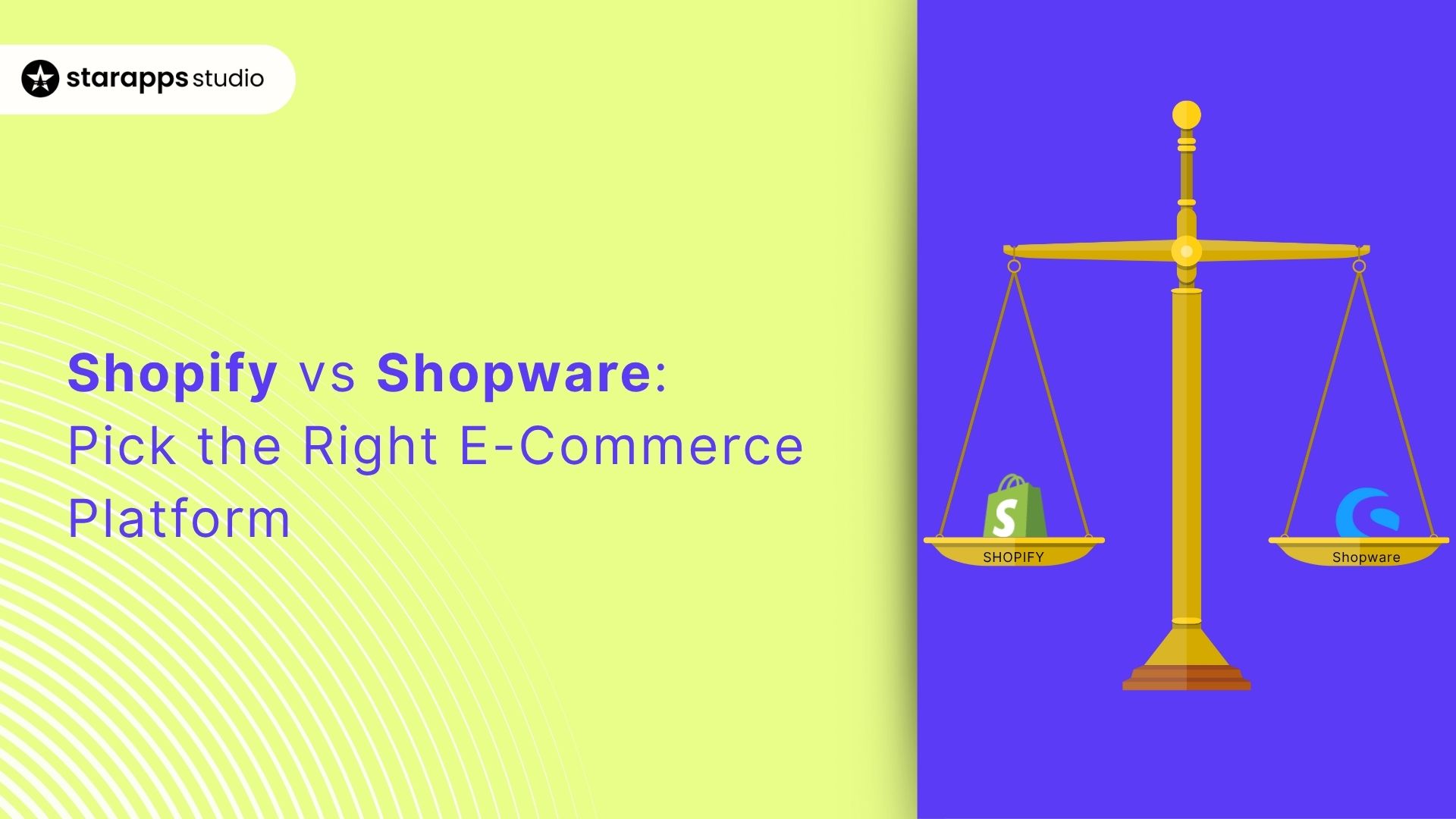
Compare Shopify vs Shopware pricing, themes, B2B tools, and SEO features. Find out which platform suits your growth needs. Choose wisely!
In 2025, global eCommerce sales are expected to exceed $6.4 trillion, creating massive opportunities for online businesses. The platform you build on plays a key role in how much of that growth you can capture.
When comparing Shopify vs Shopware, both stand out for different reasons. Shopify powers millions of active stores worldwide with its managed, user-friendly system. Shopware, with around 30,613 stores, is known for its open-source flexibility and strong European presence.
The better choice between Shopify and Shopware depends on your business model, growth stage, and the level of control you want over your store’s setup.
This guide walks you through every major difference, from pricing and customization to SEO, B2B tools, and scalability, so you can choose the platform that aligns best with your business strategy.
Key Takeaways
- Shopify is ideal if you want a quick setup, managed hosting, and an ecosystem of apps to scale easily.
- Shopware suits businesses that need full customization, self-hosting options, and flexibility for complex eCommerce setups.
- Your decision should align with your business size, technical capabilities, and growth strategy.
- Shopify vs Shopware both offer strong performance, but their value depends on how you plan to build and manage your store.
Shopify vs Shopware: An Overview
When it comes to building an online store, Shopify and Shopware are two names that often stand out among eCommerce platforms. Both offer powerful solutions for businesses looking to establish or scale their online presence, but they approach eCommerce in very different ways.
Shopify is a globally popular, cloud-based eCommerce platform known for its simplicity, speed, and user-friendly design. It enables anyone to set up an online store quickly without requiring in-depth technical expertise. With a rich ecosystem of apps, themes, and integrations, Shopify has become a go-to solution for merchants who value ease of use and a managed infrastructure.
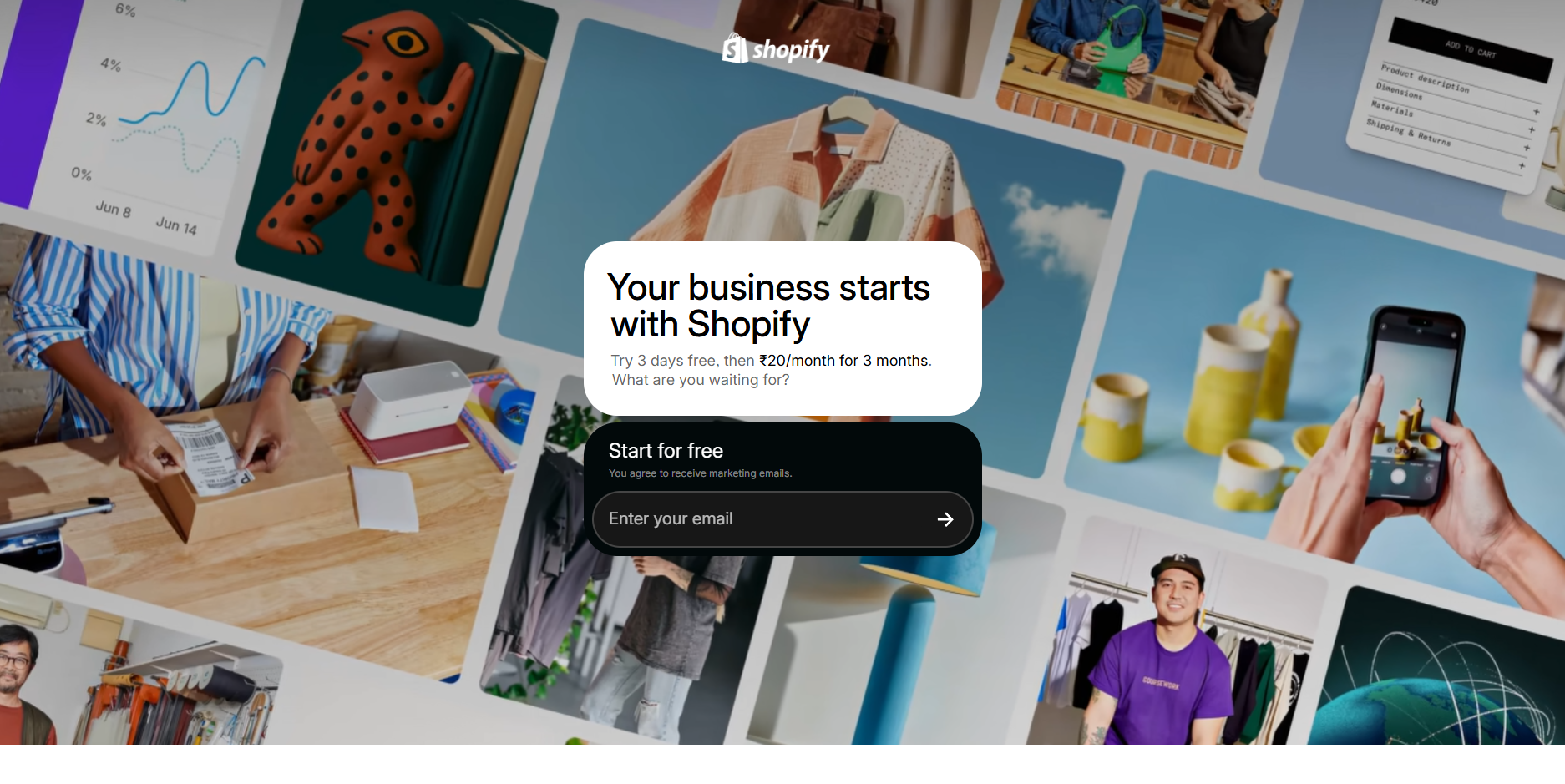
Shopware, on the other hand, is a flexible, open-source platform that caters exceptionally well to businesses that need deep customization and control. Originating in Germany, Shopware has become a preferred choice across Europe for brands seeking a tailored, content-driven eCommerce experience. It offers both self-hosted and cloud options, giving developers and merchants the freedom to create unique online stores with advanced functionality.
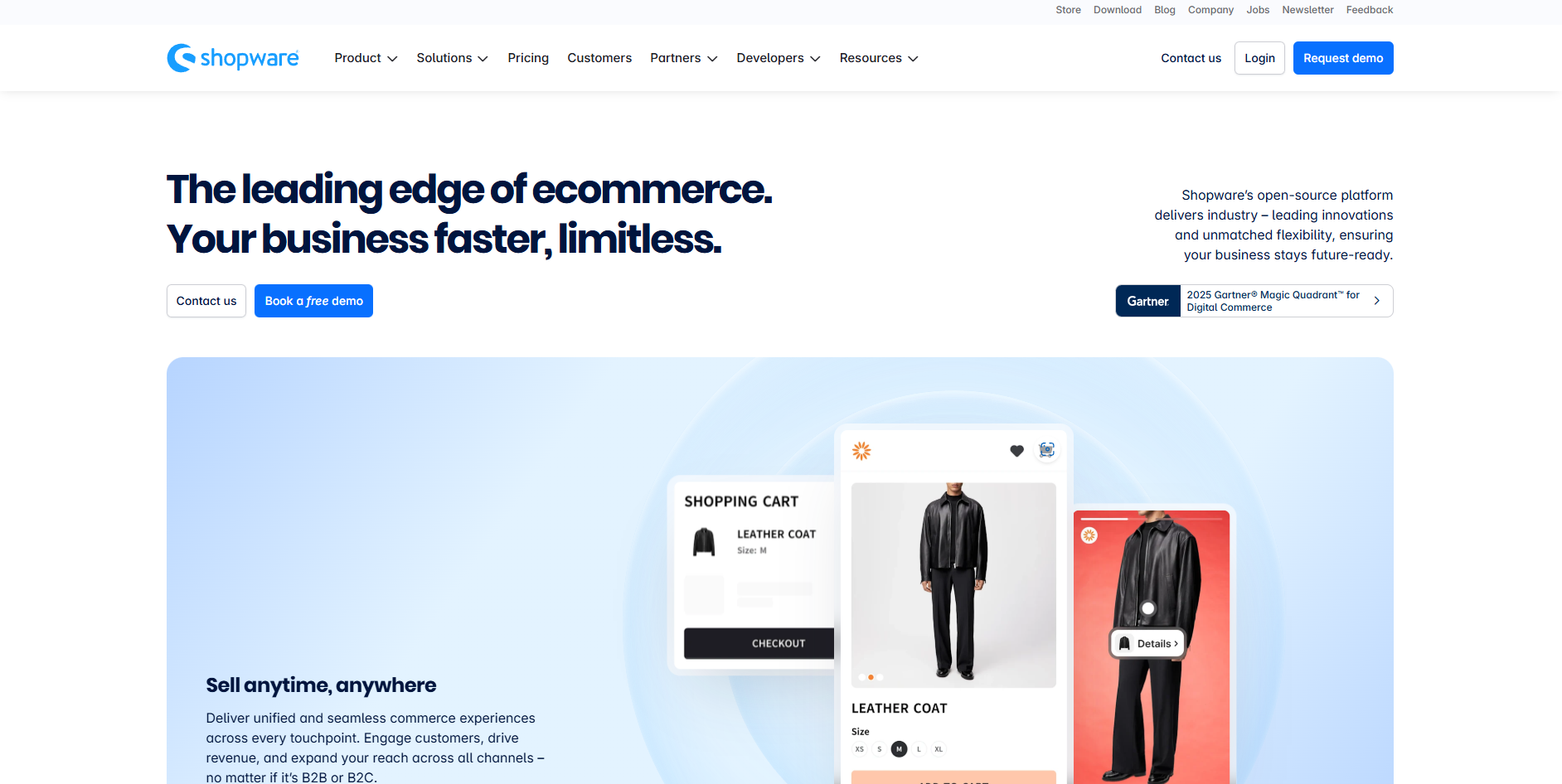
sourcelink
In short, Shopify prioritizes simplicity and scalability, while Shopware focuses on flexibility and control. Understanding these core differences is the first step before exploring their features in detail.
Shopify vs Shopware Feature-by-Feature Detailed Comparison
Each platform has strengths that are well-suited to different business models. Here’s how they compare.
Pricing Models and Cost Structure
Shopify Pricing:
- Basic ($39/month): 2.9% + 30¢ transaction fees, 2% third-party gateway fee
- Grow ($105/month): 2.6% + 30¢ fees, 1% third-party gateway fee
- Advanced ($399/month): 2.4% + 30¢ fees, 0.6% third-party gateway fee
- Plus (starting $2,000- $2,300/month): 2.15% + 30¢ fees, enterprise features
Additional costs: Premium themes ($140-$350), apps ($50-$100/month, on average), and custom development ($500-$10,000+).
Typical small business total: $150-$250/month.
Shopware Pricing:
- Community Edition (Free): Self-hosted, basic features, community support
- Rise (€600/month): Page builder, automation, 8-hour support
- Evolve (€2,400/month): Advanced search, B2B components, 4-hour support.
- Beyond (€6,500/month): Personal account manager, 1-hour support, advanced features
Additional costs: Hosting (€50-€500+/month), extensions (€50-€500+ each), development (€5,000-€50,000+), annual maintenance (€2,000-€10,000+).
Typical mid-sized business total: €3,000-€5,000/month.
Winner: Shopify for small businesses. Shopware is ideal for high-volume enterprises where percentage-based fees are more cost-effective than fixed costs.
Ease of Use and Setup Timeline
Shopify:
- Sign up and basic setup: 15-30 minutes.
- Theme customization: 2-4 hours.
- First sale possible: Same day.
- Guided onboarding, intuitive dashboard.
- Non-technical users can build professional stores.
- 24/7 support, extensive documentation.
Shopware:
- Platform installation (self-hosted): 2-4 hours.
- Server configuration: 4-8 hours.
- Theme customization: 8-16 hours.
- Integration and testing: 16-40 hours.
- First sale possible: 1-2 weeks minimum.
- Requires technical expertise or agency partner.
Winner: Shopify for ease of use and quick launch. Shopware offers more control once mastered.
Theme Selection and Design Flexibility
Shopify:
- 250+ official themes, including 23 free options and premium themes ($140–$350 or higher).
- All themes are mobile-responsive and performance-optimized.
- Drag-and-drop theme editor for no-code customization.
- Liquid templating is available for developers who require more in-depth customization.
- Some design limitations exist within Shopify’s structured framework.
- For stores with numerous product variants, apps like Variant Image Automator or Swatch King enable the creation of a more intuitive, visual shopping experience, requiring no custom code.
Shopware:
- 160+ free and premium themes (ranging from €50–€500+).
- Full code access for unrestricted design customization.
- Built with Twig templating and SCSS styling for granular control.
- Shopping Experiences drag-and-drop builder for marketers and designers.
- Supports headless commerce architectures (compatible with Vue.js, React, and Next.js).
Winner: Here, Shopware takes the lead in design freedom and flexibility, making it perfect for businesses seeking total creative control and a fully custom front-end. Shopify, meanwhile, is ideal for brands that want beautiful, high-performing designs with minimal technical setup.
B2B and Wholesale Capabilities
Shopify B2B:
Shopify’s B2B features are primarily designed for brands blending direct-to-consumer (D2C) and wholesale operations. Its core strengths lie in accessibility, speed to launch, and integration with Shopify’s broader ecosystem.
Key Highlights:
- Exclusive B2B suite on Shopify Plus (from $2,300+/month).
- Company profiles supporting multiple buyer accounts.
- Custom pricing and volume discounts per customer group.
- Support for purchase orders, net payment terms, and approval workflows.
- Basic wholesale functionality on standard plans through third-party apps.
Shopware B2B:
Shopware provides a natively built B2B suite, engineered for flexibility and deep customization. It caters to wholesalers, manufacturers, and distributors with layered account permissions, dynamic pricing logic, and full workflow automation.
Key Highlights:
- Rise Plan includes foundational B2B features.
- Evolve Plan and above reveal full B2B capabilities, including:
- Employee account hierarchies and approval chains.
- Budget and order controls.
- Customer-specific catalogs and complex pricing rules.
- Quote management and quick order entry.
- Rule Builder enables granular logic for pricing, discounts, and catalog visibility.
Winner: Shopware stands out for its built-in B2B infrastructure, offering unparalleled control over pricing, workflows, and permissions. Whereas Shopify remains the go-to option for hybrid D2C/B2B brands seeking a fast and manageable setup with solid scalability through Shopify Plus.
App and Extension Ecosystems
Shopify:
Shopify offers one of the most extensive app marketplaces in eCommerce, enabling merchants to extend their store's functionality easily. Its ecosystem prioritizes usability, integrations, and plug-and-play scalability.
Key Highlights:
- 8,000+ apps spanning marketing, sales, support, operations, and analytics.
- One-click installation with apps built to Shopify design standards.
- Smooth integration with popular tools like Klaviyo, Yotpo, Judge.me, and Privy.
- Strong ecosystem for rapid scaling and feature expansion.
- Specialized solutions from developers like StarApps Studio, such as Swatch King and Variant Title King, enhance product variant usability beyond Shopify’s native tools.
Shopware:
Shopware’s marketplace emphasizes flexibility and supports enterprise-grade integrations. While smaller than Shopify’s, it offers powerful, configurable extensions that cater to complex operational and B2B requirements.
Key Highlights:
- 2,900+ extensions across key commerce and backend functions.
- Emphasis on enterprise solutions and B2B integrations.
- Strong support for ERP connections and advanced product management.
- More technical setup, offering greater configuration control for developers and agencies.
Winner: Shopify for breadth and plug-and-play functionality; Shopware for specialized enterprise integrations.
Sales Features and Automation
Shopify:
Shopify is built to help brands sell everywhere with minimal setup. Its sales toolkit covers everything from basic discounts to advanced omnichannel selling.
Key Highlights:
- Discount codes, automatic discounts, and BOGO offers for quick promotions.
- Abandoned cart recovery and product recommendations to boost conversions.
- Gift cards and multi-currency support through Shopify Markets.
- POS integration for unified in-store and online sales.
- Shopify Flow automation (available on Plus) for workflow triggers and campaigns.
- Omnichannel selling across Instagram, Facebook, TikTok, Amazon, and eBay.
Shopware:
Shopware adopts a more advanced approach to sales automation, providing flexible tools for creating personalized and rule-based experiences. It’s designed for businesses that want to go beyond standard discounting, using data-driven conditions, custom bundles, and dynamic catalog logic to create precise promotional strategies.
Key Highlights:
- Dynamic Product Groups for auto-updating product collections.
- Rule Builder for creating complex conditions (e.g., free shipping on orders over €50 to German customers on Tuesdays).
- Flow Builder to automate processes across checkout, order handling, and marketing.
- Advanced promotion engine for tiered and targeted discounts.
- Bundle configurators to increase average order value.
- 70+ payment gateway integrations for global commerce flexibility.
Winner: Shopify for standard D2C features. Shopware for complex automation and promotional rules.
SEO and Marketing Capabilities
Shopify SEO
Shopify automates key SEO essentials. It takes care of indexing, performance, and structured data, so your store meets search standards..
What You Get:
- Automatic sitemaps and clean URLs to help search engines index your pages quickly.
- Responsive, fast-loading themes that boost performance metrics and SEO ranking.
- Editable titles, meta descriptions, and alt text for on-page optimization.
- Built-in canonical tags and SSL certificates to prevent duplicate content issues.
- Automatic structured data for rich product results.
Shopify Marketing
Shopify’s built-in marketing tools help you reach customers where they already are, in the places where they shop. You can run campaigns, manage audiences, and sync data with major ad networks directly from your dashboard.
What You Get:
- Native tools for email marketing, social ads, and Google Smart Shopping campaigns.
- Customer segmentation for personalized outreach.
- Smooth integration with tools like Klaviyo and Omnisend for advanced automation.
Shopware SEO
For granular SEO control across complex catalogs or multi-language sites, Shopware gives you unrestricted access to all configuration layers.
What You Get:
- Fully customizable URL structures for categories, products, and landing pages.
- Redirect and indexing management to maintain SEO equity during catalog changes.
- Access to robots.txt and .htaccess for advanced crawling and security rules.
- Custom metadata per variant to avoid duplication and improve SERP clarity.
- Multi-language SEO optimization for localized experiences.
Shopware Marketing
Shopware’s marketing features are built around automation and precision. You can set up behavior-based triggers, run segmented campaigns, and expand functionality with external tools when needed.
What You Get:
- Built-in newsletter and campaign builder for direct communication.
- Flow Builder automation to trigger campaigns based on customer actions.
- Advanced segmentation for data-driven targeting.
- Easy integration with email and social marketing extensions for omnichannel reach.
Winner: Shopware offers unmatched flexibility and SEO depth, giving technical teams complete control over optimization. Shopify, however, remains the better choice if you want powerful, integrated marketing tools and straightforward SEO that simply works without added complexity.
Multi-Channel Selling and Marketplace Integration
Shopify
Shopify enables quick multi-channel expansion with minimal setup, making it ideal for brands that want to reach customers wherever they shop. Its native integrations and unified dashboard simplify management across platforms.
Key Highlights:
- Social commerce support for Facebook, Instagram, TikTok, and Pinterest, allowing direct product tagging and checkout.
- Marketplace integrations with Amazon, eBay, Walmart, and Etsy for extended reach.
- Google Shopping sync for product visibility in search and ads.
- Shopify POS connects in-store and online sales under one system.
- Buy Buttons lets you embed products on blogs, partner sites, or landing pages.
- Shop app adds another discovery and re-engagement channel.
- Shopify Markets simplifies international selling with localized currencies and domains.
- The central dashboard keeps inventory and orders synced across all channels.
Best for: Fast-growing D2C and hybrid brands needing a turnkey, low-maintenance multi-channel setup.
Shopware
Shopware supports a more configurable, developer-friendly approach suited for brands managing complex infrastructures or regional storefronts. Its headless and API-driven capabilities allow businesses to design custom sales channels tailored to different audiences or use cases.
Key Highlights:
- Manage multiple storefronts from a single backend installation.
- Headless and API-first architecture for full control over front-end experiences.
- Marketplace integrations are available through extensions for Amazon, eBay, and others.
- Create dedicated B2B portals or regional stores as independent sales channels.
- Flexible data sync and workflow automation across systems and marketplaces.
Best for: Enterprises and wholesalers that require custom channel architectures and deeper integration with internal systems.
Checkout Experience and Payment Processing
Shopify
If you want a fast, high-converting checkout, Shopify makes it easy out of the box. Shop Pay drives strong performance, and express payment options reduce friction. Customization is limited on lower plans but expands significantly on the Plus plan.
Key Highlights:
- Shop Pay one-click checkout (converts up to 50% better).
- Express checkouts: Apple Pay, Google Pay, PayPal.
- Custom fields are limited on standard plans, fully customizable on Plus.
- Address verification and abandoned cart recovery are built in.
- Third-party gateways incur additional fees ranging from 0.6% to 2%.
Shopware
If you need a fully customized checkout process, Shopware offers the flexibility to design it from scratch. You can create B2C or B2B flows, add custom validations, and integrate any payment processor.
Key Highlights:
- Fully customizable single-page or multi-step checkout.
- Add custom fields, validations, and PO numbers for B2B.
- Support for net payment terms and manual approvals.
- Support for over 70 payment gateways with no platform fees.
- Negotiate rates directly with your payment processors.
Winner: Shopify for conversion-optimized checkout; Shopware for full customization and no platform fees on large volumes.
Scalability and Growth Potential
Shopify
You don’t have to worry about performance tuning or server management. Shopify automatically scales to meet traffic demand and includes enterprise-grade reliability.
Key Highlights:
- Automatic scaling during traffic surges.
- Unlimited bandwidth and global CDN.
- 99.98% uptime SLA.
- Automatic security updates and maintenance-free hosting.
- Shopify Plus unlocks enterprise functionality.
Shopware
Shopware’s flexibility lets you architect your own performance stack. It’s ideal if you have a technical team that can manage scaling infrastructure.
Key Highlights:
- Performance depends on your chosen hosting setup.
- API-first design supports high-volume transactions.
- Multi-server deployment for enterprise operations.
- Requires technical expertise for optimization, caching, and load balancing.
Winner: Shopify for hands-off, automatic scaling; Shopware for teams needing custom, performance-tuned architectures.
Support, Community, and Documentation
Shopify
You gain direct access to support whenever you need it, along with a vast ecosystem of experts and partners for specialized assistance.
Key Highlights:
- 24/7 email and chat support on all plans.
- Phone support on the Grow plan and above.
- Active community forums and a detailed Help Center.
- Shopify Experts Marketplace for hiring professionals.
- Shopify Plus includes a dedicated Launch Manager.
Shopware
Shopware support is structured by plan level, offering more personalized assistance as your business scales. Its developer community is strong, especially in Europe.
Key Highlights:
- Rise: 8-hour response.
- Evolve: 4-hour response.
- Beyond: 1-hour response with a personal account manager.
- Community Edition: community support only.
- 1,600+ certified agency partners.
- Comprehensive technical documentation for developers.
Winner: Shopify for immediate, accessible support; Shopware for technical teams needing structured, expert-level assistance.
Security and Compliance
If you prefer a platform that handles all security automatically, Shopify is fully managed and certified at the highest level. You don’t need to configure servers, install patches, or manage PCI compliance, as all these tasks are included.
Key Highlights:
- PCI DSS Level 1 certified for all stores.
- SSL certificates are automatically applied.
- Fraud analysis, two-factor authentication, and data encryption by default.
- Automatic updates and daily backups.
- GDPR compliance tools for data requests and consent management.
- Shopify manages all infrastructure, monitoring, and compliance.
Best for: Teams that want reliable, hands-off security without technical maintenance.
Shopware
Shopware offers flexibility for businesses that prefer to manage their own infrastructure or host their own solutions. You have full visibility and control, but also bear responsibility for applying security patches and maintaining compliance standards.
Key Highlights:
- PCI DSS compliance depends on your hosting setup.
- SSL certificates are required but not bundled for self-hosted versions.
- Security updates are provided when you manually apply them.
- GDPR-ready tools, password policies, and granular permissions included.
- In cloud-hosted environments, security responsibility is shared between you and your provider.
Best for: Technical teams or enterprises that want direct control over security policies and hosting environments.
Real-World Use Cases of Shopify and Shopware
Real businesses making real money tell the actual story. Let's examine brands that chose each platform.
Shopify Success Stories
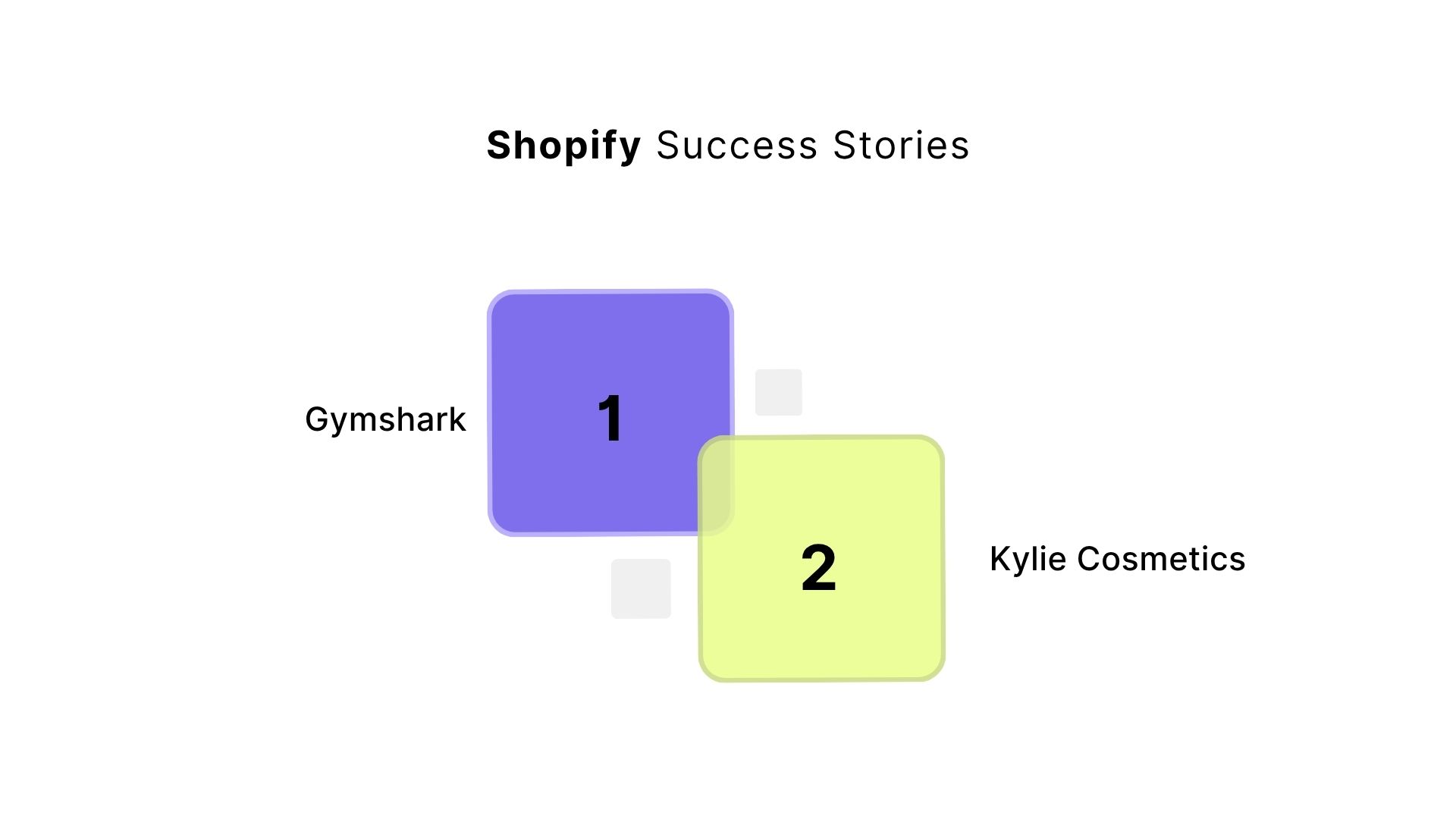
1. Gymshark
- Industry: Fitness Apparel
- Annual Revenue: £500+ million ($709 million)
Ben Francis founded Gymshark in 2012, at the age of 19. The brand migrated to Shopify Plus after a catastrophic Black Friday on Magento left customers unable to purchase.
How Shopify Helped:
- Handled massive Black Friday traffic without downtime.
- Scaled from student project to unicorn status (valued at $1.4 billion).
- Supported rapid international expansion.
- Integrated with social media-driven marketing.
- Enabled omnichannel selling.
2. Kylie Cosmetics
- Industry: Beauty & Cosmetics
- Annual Revenue: $200+ million
Kylie Jenner launched her cosmetics line, requiring a platform that could handle viral product drops and massive traffic spikes.
How Shopify Helped:
- Handled extreme traffic during launches without crashing.
- Enabled quick product releases and limited-edition drops.
- Integrated with social platforms for direct shopping.
- Provided analytics to understand customer behavior.
- Supported rapid scaling to a nine-figure business.
Shopware Enterprise Use Cases
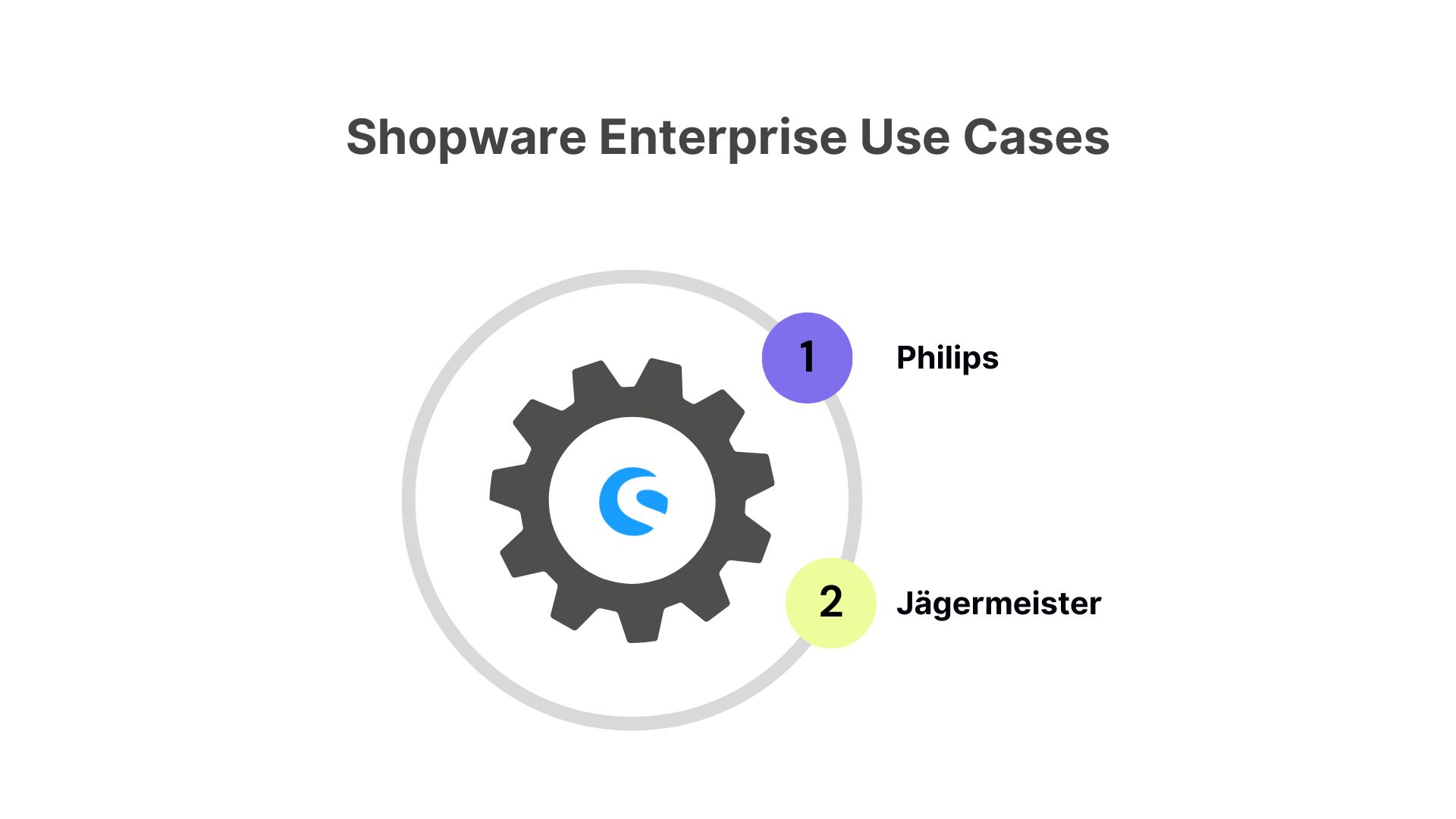
1. Philips
- Industry: Electronics & Healthcare
- Global Reach: Multinational corporation
Philips required a platform that could handle complex product catalogs, multiple markets, and sophisticated B2B operations across diverse business units.
How Shopware Helped:
- Managed extensive product catalogs with technical specifications.
- Supported multiple storefronts for different divisions.
- Handled complex B2B pricing and customer segmentation.
- Integrated with enterprise systems.
- Provided flexibility for regional customization.
2. Jägermeister
- Industry: Beverages & Spirits
- Market: European and global distribution
Jägermeister required a platform that manages age verification, regional restrictions, and brand storytelling, in addition to eCommerce.
How Shopware Helped:
- Implemented sophisticated age verification workflows.
- Created premium brand experiences.
- Managed regional compliance requirements.
- Integrated with distribution networks.
- Customized checkout for spirits regulations.
These brands prove that both Shopify and Shopware can deliver powerful results when used in the right context. What matters is choosing a platform that aligns with your business goals.
How to Choose Between Shopify and Shopware?
You've seen features, studied use cases, and compared platforms side by side. Now comes the decision. The right choice depends on your specific situation.
When to Choose Shopify
Shopify is the right fit when you want to grow fast without managing technical complexity. It’s designed for ease of use, fast setup, and dependable scalability so you can focus on sales and marketing.
Choose Shopify if you:
- Need to launch quickly and validate your business without developer involvement.
- Run a direct-to-consumer brand and rely on social channels like Instagram, TikTok, and Facebook.
- Have limited technical resources but want to manage the store internally.
- Prefer predictable monthly costs and transparent app pricing.
- Plan to expand internationally with built-in multi-currency and localization support.
- Sell across multiple channels, including your website, marketplaces, and retail locations, with synced inventory.
- Need reliable uptime and automatic handling of high-traffic periods, such as major sales events.
When to Choose Shopware
Shopware is ideal for businesses that need deeper control, customization, or complex workflows. It suits B2B operations, enterprise setups, and brands that want full flexibility in design and integrations.
Choose Shopware if you:
- Operate a B2B or hybrid B2B/B2C model needing custom pricing, approval flows, and buyer hierarchies.
- Require deep integration with ERP, PIM, accounting, or procurement systems.
- Need extensive customization for checkout logic, pricing structures, or storefront design.
- Manage multiple storefronts or brands from one backend.
- Have in-house developers or agency partners to manage and customize the platform.
- Need advanced automation using Rule Builder and Flow Builder.
- Handle high transaction volumes and want to avoid percentage-based platform fees.
- Operates primarily in Europe and needs flexibility with hosting and compliance.
- Value long-term scalability and control over infrastructure and source code.
Questions to Ask Before You Decide
- Do you have developers or agency partners available?
- How quickly do you need to launch?
- Is your business primarily B2C, B2B, or a mix of both?
- Do you need custom functionality beyond standard platform tools?
- What is your total cost tolerance, including setup and maintenance?
- How much control do you want over hosting and infrastructure?
- What is your expected transaction volume in the next 12 to 24 months?
- How many internal systems need to connect to your eCommerce platform?
Your honest answers point toward the right platform.
How to Optimize Your Chosen Platform for Better Results?
If you’ve chosen Shopify, you’ve already picked one of the most reliable and growth-ready eCommerce platforms available. Its ecosystem makes it an ideal foundation for fast-moving brands. But like any platform, results depend on how well you optimize it.
Out of the box, Shopify performs well. Yet, the difference between a good store and a great one lies in the details of customer experience, variant presentation, and on-page engagement. That’s where StarApps Studio comes in. Known for creating some of the most trusted Shopify apps for product management and optimization, StarApps helps merchants overcome Shopify’s built-in limitations around product variants and display.
Below are the key StarApps tools that can help you elevate your Shopify store experience.
Swatch King
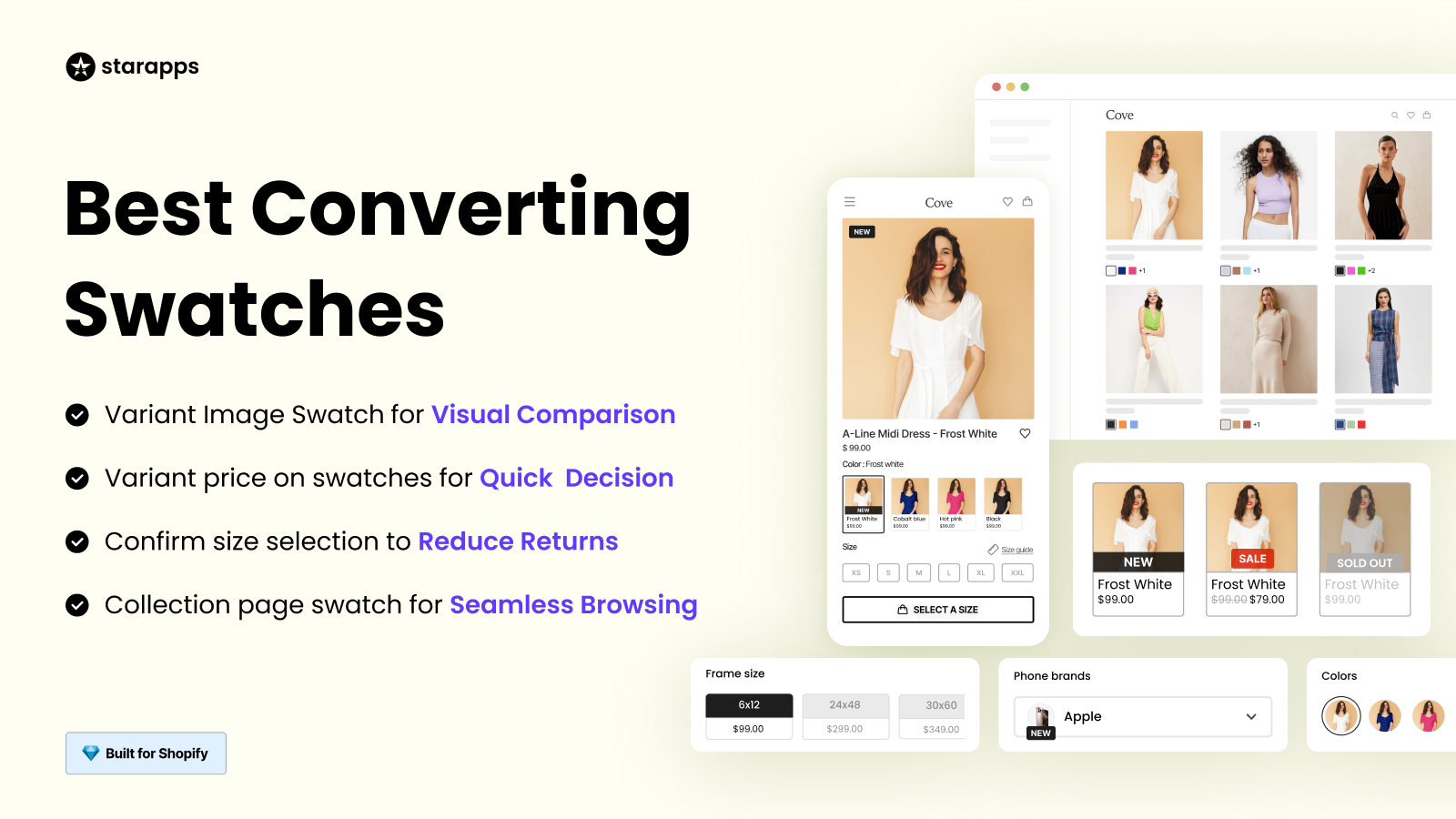
Swatch King helps you turn plain dropdowns into visually rich variant selectors. Instead of customers guessing what each option looks like, they can see it instantly, in color, texture, or design.
How It Optimizes Your Store:
- Displays variant options as color or image swatches for quick visual selection.
- Displays swatches directly on collection pages to expedite browsing.
- Automatically hides out-of-stock variants to prevent customer frustration.
- Adds price differences directly to variant options for clarity.
- Supports unlimited variants beyond Shopify’s standard limits.
- Ensures customers select a variant before adding to the cart.
SA Variant Image Automator
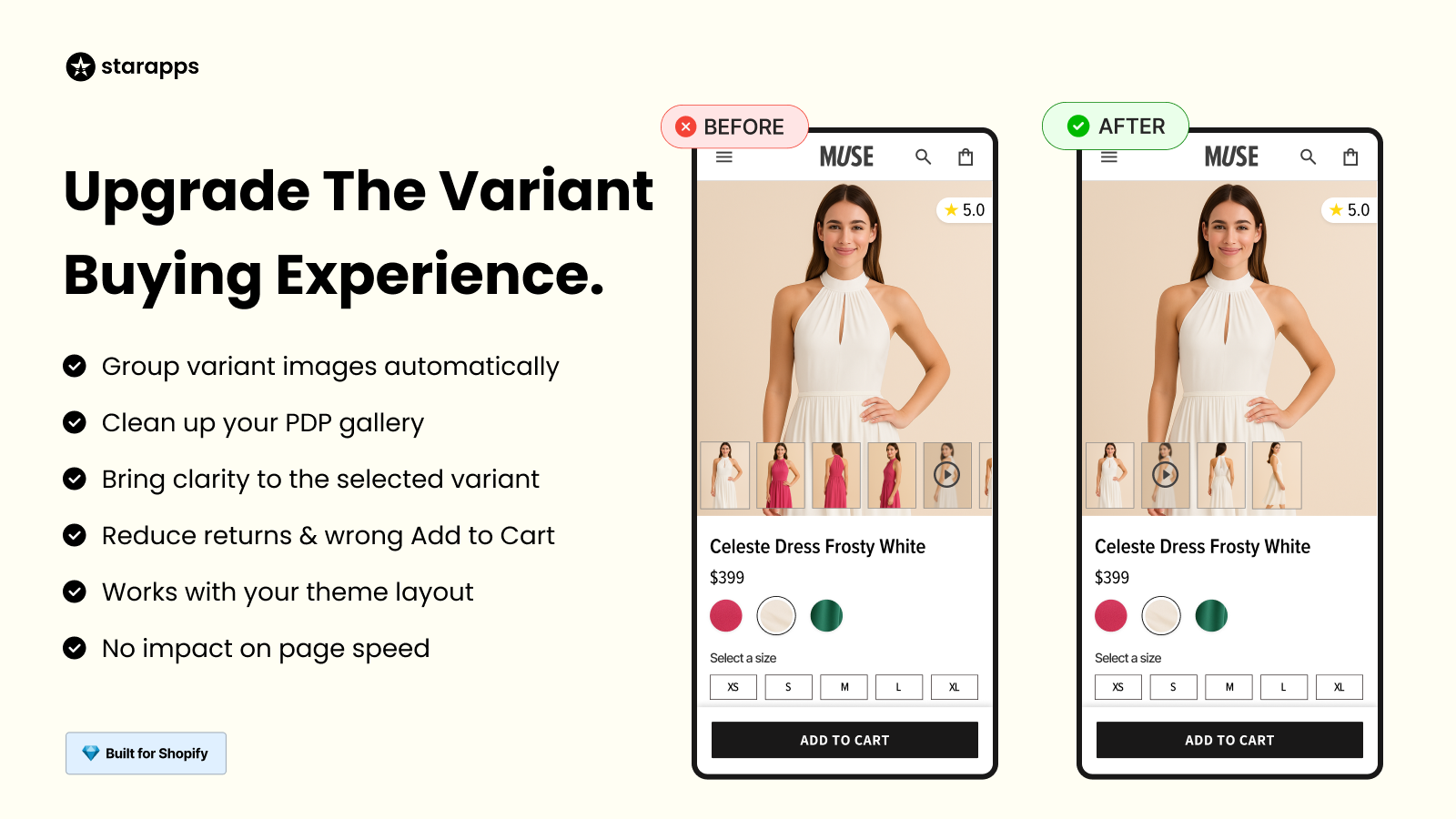
Managing variant images manually can be tedious. SA Variant Image Automator addresses this by automatically assigning and displaying the correct images for each variant, resulting in a clean and intuitive shopping experience.
How It Optimizes Your Store:
- Automatically assigns multiple images per variant with no manual setup.
- Shows only relevant images when a customer selects a variant.
- Keeps product galleries clutter-free and organized.
- Works for complex or straightforward variant structures.
- Integrates seamlessly with your theme and other StarApps products.
- Handles unlimited variants and images efficiently.
Variant Title King
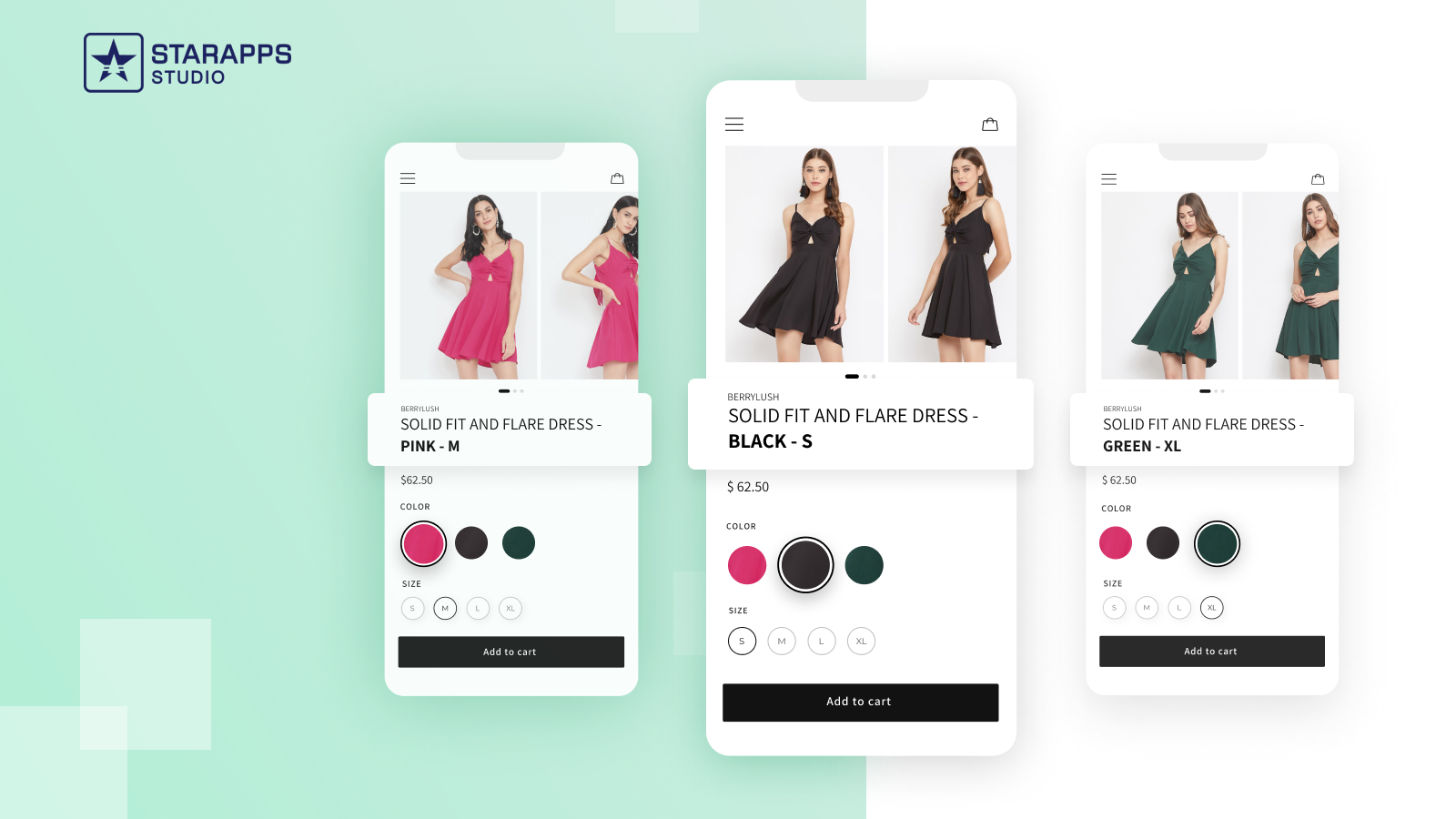
Customers often get confused when product titles do not accurately reflect their selected variant. Variant Title King solves that by dynamically updating product titles based on customer selection, so there’s no doubt about what’s being ordered.
How It Optimizes Your Store:
- Updates titles in real time when variants are selected.
- Displays color, size, SKU, or vendor info in product titles.
- Reduces ordering mistakes and return rates.
- Works with all Shopify themes and multilingual setups.
- Integrates smoothly with other StarApps apps.
SA Variants: Combined Listings

Shopify’s default setup hides individual variants under a single product listing, limiting discoverability. SA Variants: Combined Listings changes that by treating each variant as its own listing for better visibility across your store and search engines.
How It Optimizes Your Store:
- Displays each variant as a separate listing on collection pages.
- Creates unique URLs, images, and titles for every variant.
- Improves SEO performance with variant-specific pages.
- Allows side-by-side comparison between variants.
- Keeps variants linked and synchronized across product pages.
- Enables filtering and sorting based on variant-specific attributes.
StarApps Studio’s suite of apps addresses core Shopify challenges related to variants and product experience. Used together, they help your store look polished, perform faster, and feel more intuitive.
With the proper optimization stack from StarApps Studio, your Shopify store can deliver the kind of shopping experience customers expect from premium eCommerce brands.
Conclusion
When evaluating Shopify vs. Shopware, consider how you want to build and grow your store. Shopify gives you a faster start and a managed setup that keeps operations simple as you scale. Shopware provides you with more room to customize and fine-tune every detail, allowing you to prefer hands-on control.
If Shopify aligns better with your goals, StarApps Studio can help you maximize its potential. You can use our apps to simplify product management, automate repetitive tasks, and enhance your store’s overall performance without technical hassle.
Reach out to StarApps Studio to explore how our tools can strengthen your Shopify store and help you grow with confidence.
FAQ’s
1. Is Shopware like Shopify?
Shopware and Shopify both help businesses build online stores, but they work differently. Shopify is a hosted platform with built-in tools, while Shopware is open-source and allows deeper customization.
2. Who uses Shopware?
Shopware is popular among mid-sized and enterprise businesses, especially in Europe. Brands like Philips and Jägermeister use it for complex, multi-store, and B2B setups.
3. Is Shopware good for SEO?
Yes. Shopware offers strong SEO capabilities, including customizable URLs, metadata, and content management tools that support organic visibility.
4. Is Netflix made on Shopify?
No. Netflix is not built on Shopify. Shopify is designed for eCommerce businesses, while Netflix runs on its own custom platform for streaming services.
5. Which luxury brands use Shopify?
Several luxury brands use Shopify and Shopify Plus, including Kylie Cosmetics, Victoria Beckham Beauty, and Jimmy Choo.
Heading
End-to-end traceability
To ensure regulatory compliance, you must have a complete overview of your products from production to shipping. Book a demo to see how Katana can give you full visibility of your operations.


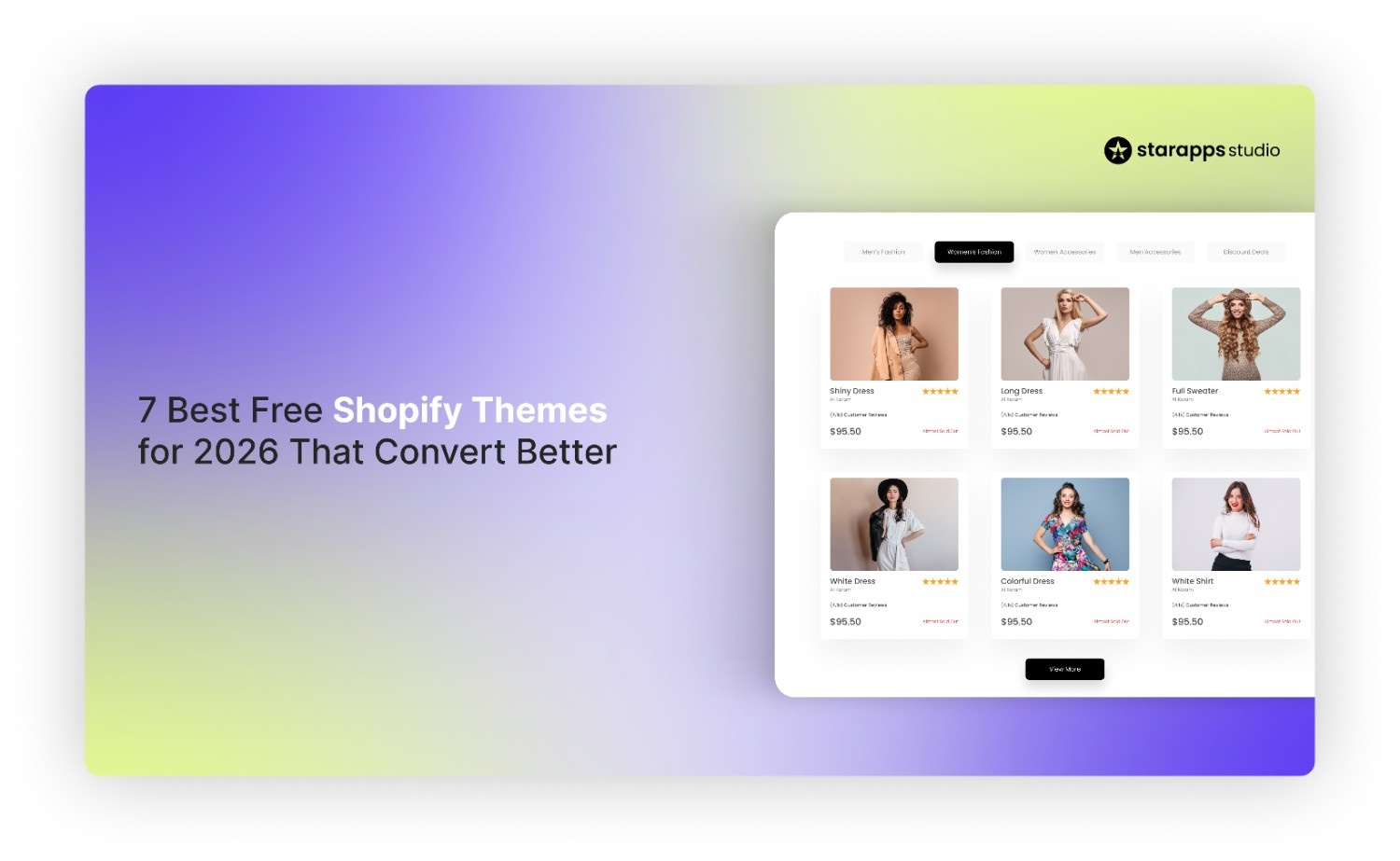
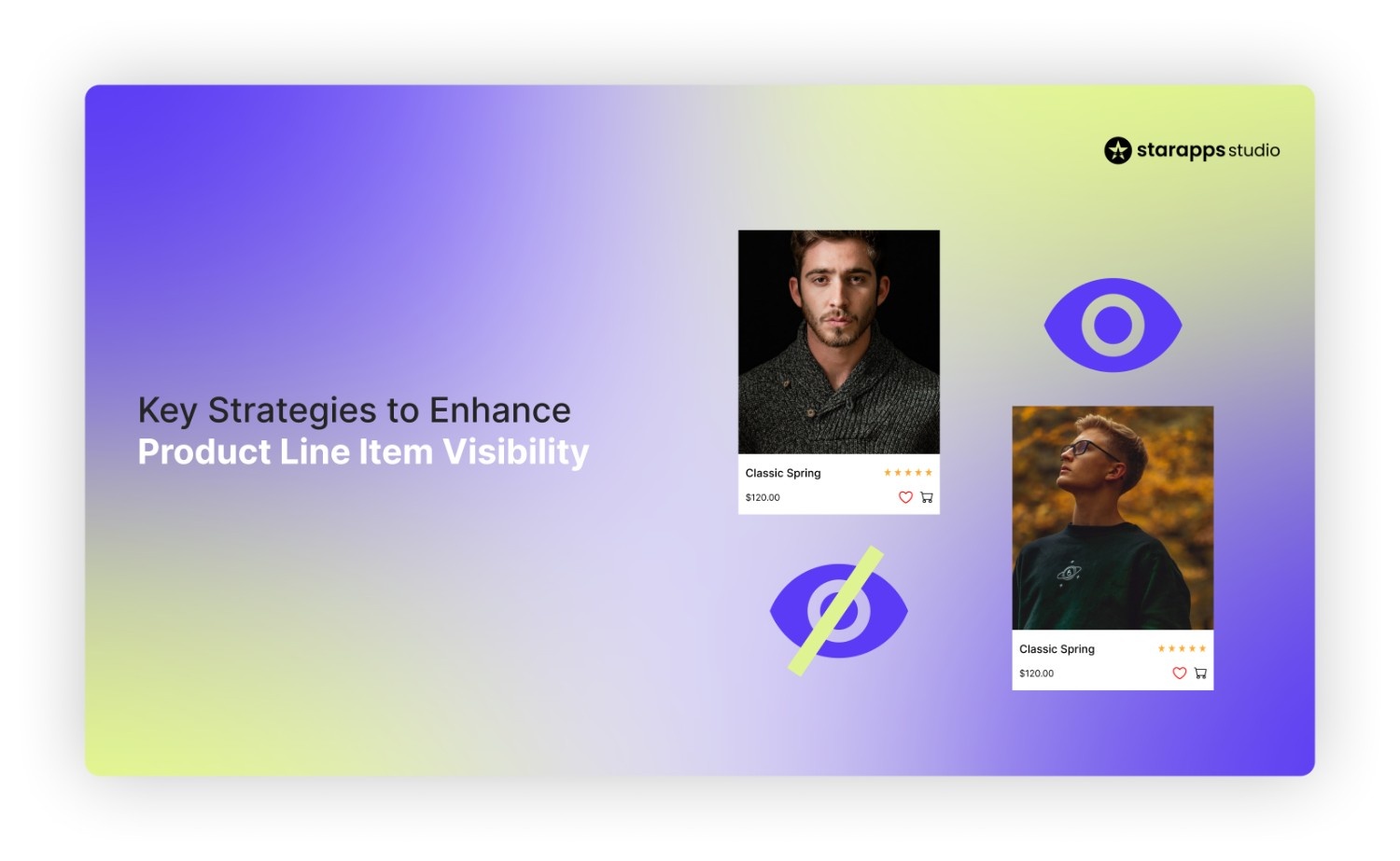

.png)
.png)